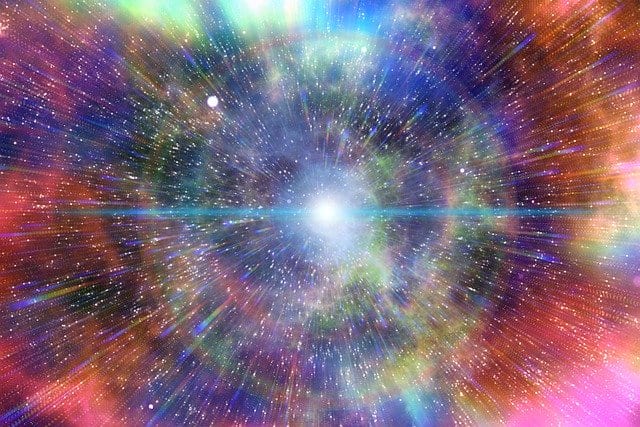
Atheist and anti-theist Bob Seidensticker, who was “raised Presbyterian”, runs the influential Cross Examined blog. He asked me there, on 8-11-18: “I’ve got 1000+ posts here attacking your worldview. You just going to let that stand? Or could you present a helpful new perspective that I’ve ignored on one or two of those posts?” He also made a general statement on 6-22-17: “Christians’ arguments are easy to refute . . . I’ve heard the good stuff, and it’s not very good.” He added in the combox: “If I’ve misunderstood the Christian position or Christian arguments, point that out. Show me where I’ve mischaracterized them.” Such confusion would indeed be predictable, seeing that Bob himself admitted (2-13-16): “My study of the Bible has been haphazard, and I jump around based on whatever I’m researching at the moment.”
Bob (for the record) virtually begged and pleaded with me to dialogue with him in May 2018, via email. But by 10-3-18, following massive, childish name-calling attacks against me, encouraged by Bob on his blog (just prior to his banning me from it), his opinion was as follows: “Dave Armstrong . . . made it clear that a thoughtful intellectual conversation wasn’t his goal. . . . [I] have no interest in what he’s writing about.”
And on 10-25-18, utterly oblivious to the ludicrous irony of his making the statement, Bob wrote in a combox on his blog: “Someone who’s not a little bit driven to investigate cognitive dissonance will just stay a Christian, fat ‘n sassy and ignorant.” Again, Bob mocks some Christian in his combox on 10-27-18: “You can’t explain it to us, you can’t defend it, you can’t even defend it to yourself. Defend your position or shut up about it. It’s clear you have nothing.” And again on the same day: “If you can’t answer the question, man up and say so.” And on 10-26-18: “you refuse to defend it, after being asked over and over again.” And again: “You’re the one playing games, equivocating, and being unable to answer the challenges.”
Bob’s cowardly hypocrisy knows no bounds. Again, on 6-30-19, he was chiding someone for something very much like he himself: “Spoken like a true weasel trying to run away from a previous argument. You know, you could just say, ‘Let me retract my previous statement of X’ or something like that.” Yeah, Bob could! He still hasn’t yet uttered one peep in reply to — now — 41 of my critiques of his atrocious reasoning.
Bible-Basher Bob’s words will be in blue. To find these posts, follow this link: “Seidensticker Folly #” or see all of them linked under his own section on my Atheism page.
*****
Bob’s article, “God Created the Universe From Nothing—Or Did He?” (1-3-19) exhibits his usual profound ignorance of the Bible and complete inability to engage in cross-referencing. Bible-Basher Bob always knows better than anyone and everyone else, and is the Ultimate Bible Expert (so he himself would inform anyone within earshot): that is, until someone opposes his reasoning: at which point he flees to the hills in terror. At least that is what he has always done with me: now, 41 times (and I would bet the farm that this will be the 42nd time he does that).
The Christian idea of creation ex nihilo, that God created the universe from nothing, is a doctrine within many denominations. The problem appears when Christians try to find it in the Genesis six-day creation story. It’s not there.
Who’s to say that the “six days” of creation in Genesis are to be taken literally? At least as far back as St. Augustine in the 5th century, Christians thought otherwise, and the majority of informed Christians do so today. Young earth creationists are a small minority, out of the mainstream. But many anti-theist atheists — true to form — keep considering them mainstream and the sum of Christianity (because so many of them used to be fundamentalists).
Like so many confidently stated doctrines, the Bible doesn’t cooperate. Letting the Bible speak for itself exposes the unsupported claims.
Right. Bob knows more than Bible scholars, no matter how many years of their lives they have devoted to studying the Bible. This is a question apart from whether the teachings of the Bible are accepted or not. A person can be an expert on what something actually teaches, whether it is true or not, or even fictional or not. Say, for example, a scholar studied Homer’s Iliad for 50 years. Maybe he was even the world’s leading expert on it. Would it make sense for Bob (who skimmed it years ago) to blithely assume that he understood better than the scholar, the contents of the book? Of course not. But Bob does this with the Bible, and Christian scholars and apologists all the time. It’s the height of self-important arrogance.
“In the beginning . . .”
The first verse of the Bible says, “In the beginning God created the heavens and the earth” (Genesis 1:1, NIV). It doesn’t say that God created out of nothing, and only the lack of specified materials that God worked with supports creation ex nihilo.
Look more closely at the word created (the Hebrew word bara). This word is used 55 times in the Old Testament. Most instances are translated as “create,” but not all, and few could be read as “create from nothing.” For example, it’s “make a signpost” in Ezekiel 21:19 and “create in me a pure heart” in Psalm 51:10, which are obviously talking about forming out of existing material. The NET Bible agrees: “The verb does not necessarily describe creation out of nothing . . . it often stresses forming anew, reforming, renewing.”
Okay, now that Bob has had his fun, let’s see what the Bible actually teaches about this. There are many verses in support of creatio ex nihilo: passages that, according to Bob, don’t exist in the Bible. I found almost all of them way back in 1981, when I was just starting out in apologetics. Here they are:
Psalms 33:6 (RSV) By the word of the LORD [i.e., not by existing matter] the heavens were made, and all their host by the breath of his mouth.
Isaiah 44:24 . . . “I am the LORD, who made all things . . . “
Wisdom 1:14 For he created all things that they might exist, . . .
John 1:3 all things were made through him, and without him was not anything made that was made.
Romans 11:36 For from him and through him and to him are all things. . . .
1 Corinthians 8:6 yet for us there is one God, the Father, from whom are all things and for whom we exist, and one Lord, Jesus Christ, through whom are all things and through whom we exist.
Ephesians 3:9 . . . God who created all things;
Colossians 1:16 for in him all things were created, in heaven and on earth, visible and invisible, whether thrones or dominions or principalities or authorities — all things were created through him and for him.
Hebrews 2:10 . . . he, for whom and by whom all things exist . . .
2 Peter 3:5 . . . by the word of God [i.e., not by existing matter] heavens existed long ago . . .
Revelation 4:11 “. . . our Lord and God, . . . didst create all things, and by thy will they existed and were created.”
Bob stated: “only the lack of specified materials that God worked with supports creation ex nihilo.” Okay, so such “materials” would be included in the category of “things” would they not? So if God created all “things” then He must have created ex nihilo because no thing (nothing) existed initially if there was no thing that He did not create. How much clearer could it be made? After all, “nothing” according to Merriam-Webster online, means “not any thing: no thing.” Therefore, creating “all things” means the same thing as “creating from nothing”; i.e., creation ex nihilo.
So that’s what the Bible teaches: eleven passages for Bob to ponder before he zealously writes up his next hit-piece on the Bible. And of course modern Big Bang cosmology agrees with this. Christian philosopher William Lane Craig sums up the current state of knowledge in his paper, “Creation ex nihilo: Theology and Science”:
An initial cosmological singularity therefore forms a past temporal extremity to the universe. We cannot continue physical reasoning, or even the concept of spacetime, through such an extremity. For this reason most cosmologists think of the initial singularity as the beginning of the universe. On this view the big bang represents the creation event; the creation not only of all the matter and energy in the universe, but also of spacetime itself. [11]
The term “Big Bang,” originally a derisive expression coined by Fred Hoyle to characterize the beginning of the universe predicted by the Friedman-Lemaître model, is thus potentially misleading, since the expansion cannot be visualized from the outside (there being no “outside,” just as there is no “before” with respect to the Big Bang).
The standard Big Bang model, as the Friedman-Lemaître model came to be called, thus describes a universe which is not eternal in the past, but which came into being a finite time ago. Moreover, –and this deserves underscoring–the origin it posits is an absolute origin ex nihilo. For not only all matter and energy, but space and time themselves come into being at the initial cosmological singularity. As John Barrow and Frank Tipler emphasize, “At this singularity, space and time came into existence; literally nothing existed before the singularity, so, if the Universe originated at such a singularity, we would truly have a creation ex nihilo.” [12] On the standard model the universe originates ex nihilo in the sense that at the initial singularity it is true that There is no earlier space-time point or it is false that Something existed prior to the singularity.
Beginningless Models
Although advances in astrophysical cosmology have forced various revisions in the standard model [13], nothing has called into question its fundamental prediction of the finitude of the past and the beginning of the universe. Indeed, as James Sinclair has shown, the history of 20th century cosmogony has seen a parade of failed theories trying to avert the absolute beginning predicted by the standard model. [14] These beginningless models have been repeatedly shown either to be physically untenable or to imply the very beginning of the universe which they sought to avoid. Meanwhile, a series of remarkable singularity theorems has increasingly tightened the loop around empirically tenable cosmogonic models by showing that under more and more generalized conditions, a beginning is inevitable. In 2003 Arvind Borde, Alan Guth, and Alexander Vilenkin were able to show that any universe which is, on average, in a state of cosmic expansion throughout its history cannot be infinite in the past but must have a beginning. [15] In 2012 Vilenkin showed that cosmogonic models which do not fall under this single condition fail on other grounds to avert the beginning of the universe. Vilenkin concluded, “There are no models at this time that provide a satisfactory model for a universe without a beginning.” [16] In an article in the online journal Inference published in the fall of 2015 Vilenkin strengthened that conclusion: “We have no viable models of an eternal universe. The BGV theorem gives reason to believe that such models simply cannot be constructed.” [17] . . .
Given the metaphysical impossibility of the universe’s coming into being from nothing, belief in a supernatural Creator is eminently reasonable. At the very least we can say confidently that the person who believes in the doctrine of creatio ex nihilo will not find himself contradicted by the empirical evidence of contemporary cosmology but on the contrary fully in line with it.
Footnotes
11 P. C. W. Davies, “Spacetime Singularities in Cosmology,” in The Study of Time III, ed. J. T. Fraser (New York: Springer Verlag, 1978), 78-79.
12 John Barrow and Frank Tipler, The Anthropic Cosmological Principle (Oxford: Clarendon Press, 1986), 442.
13 Principally the addition of an early inflationary era and an accelerating expansion.
14 William Lane Craig and James Sinclair, “The Kalam Cosmological Argument,” in The Blackwell Companion to Natural Theology, ed. Wm. L. Craig and J. P. Moreland (Oxford: Wiley-Blackwell, 2009), pp. 101-201; idem, “On Non-Singular Spacetimes and the Beginning of the Universe,” in Scientific Approaches to the Philosophy of Religion, ed. Yujin Nagasawa, Palgrave Frontiers in Philosophy of Religion (London: Macmillan, 2012), pp. 95-142.
15 A. Borde, A. Guth, A. Vilenkin, “Inflationary Spacetimes Are Incomplete in Past Directions,”Physical Review Letters 90 (2003): 151301.
16 Alexander Vilenkin, “Did the universe have a beginning?” [You Tube] Cf. Audrey Mithani and Alexander Vilenkin, “Did the universe have a beginning?” arXiv:1204.4658v1 [hep-th] 20 Apr 2012, p. 1, where they state: “None of these scenarios can actually be past-eternal.”
17 Alexander Vilenkin, “The Beginning of the Universe,”Inference: International Review of Science 1/ 4 (Oct. 23, 2015).
The next story in Genesis, the centuries-older Garden of Eden story, also has God creating, but here he creates using something else—for example, Eve was created from Adam’s rib, and Adam was created from dust.
Yep, but of course the things He used to create men and women (dust, ribs) were already part of the group of “all things” that God created, therefore, this is no disproof of the initial creation ex nihilo.
God did use existing matter—water
Let’s continue the Genesis 1 creation story with verse 2: “Now the earth was formless and empty, darkness was over the surface of the deep, and the Spirit of God was hovering over the waters.” The “deep” is the ocean, and the metaphorically relevant aspect here is the ocean as chaos. The six-day creation story shows God creating order from chaos.
This water wasn’t made by God but was material that he worked with.
This is just plain silly. Here is the text:
Genesis 1:1-2 In the beginning God created the heavens and the earth. [2] The earth was without form and void, and darkness was upon the face of the deep; and the Spirit of God was moving over the face of the waters.
The logical, straightforward interpretation is that God made the heavens (the universe); we know that He did so out of nothing, from all the passages presented above. At first the earth that He created from nothing as part of the universe was “without form and void”. Then God began to work with the initial chaotic form to make the earth as we know it. Verse 2 cannot be taken in isolation apart from verse 1. It’s false to say that the “water wasn’t made by God” because the Bible teaches that God made all things out of nothing (which would include the water on the early “formless” earth. Nothing in that notion precludes further “developmental” creation.
He separated the water into two parts, the sky (held up by a vault) and the ocean (Gen. 1:7). Next, we read “Let [the ocean water] be gathered to one place, and let dry ground appear,” so God didn’t create the land either.
He certainly did. This was a further “developmental” creation from the matter of the universe in toto that He initially created. There is no logical necessity at all to interpret this as “water existed eternally” and God created from it. It’s ludicrous. Bob is so caught-up in his anti-Christian zeal that he can’t even read simple English. This is what extreme bias does to a mind.
The New Testament agrees:
By God’s word the heavens came into being and the earth was formed out of water and by water (2 Peter 3:5).
Exactly. God made the initial formless earth that included water. Then He proceeded to further develop the earth as we know it. He ignores the first part of the verse, “By God’s word the heavens came into being”. No problem at all . . .
***
Photo credit: [public domain / Max Pixel]
***












